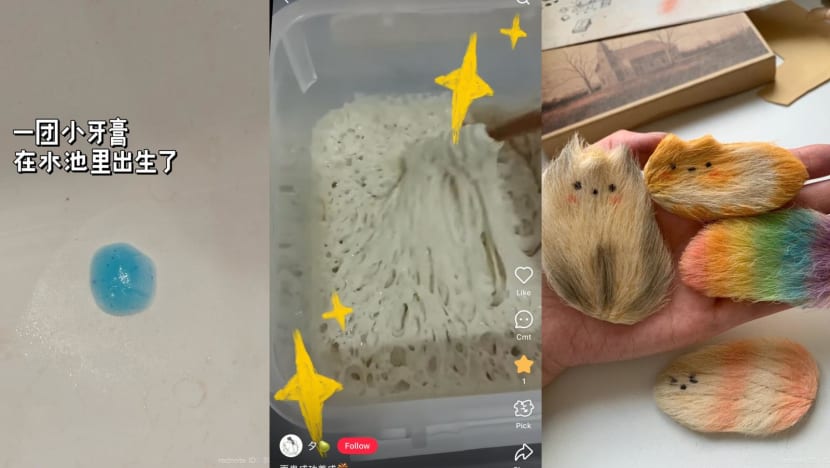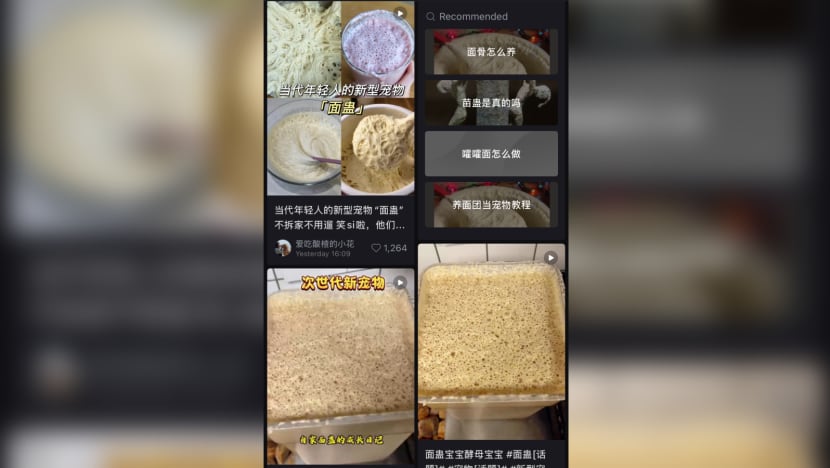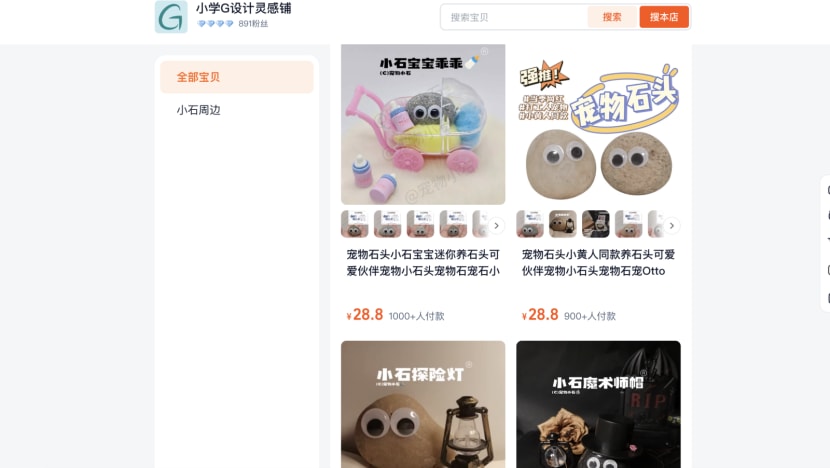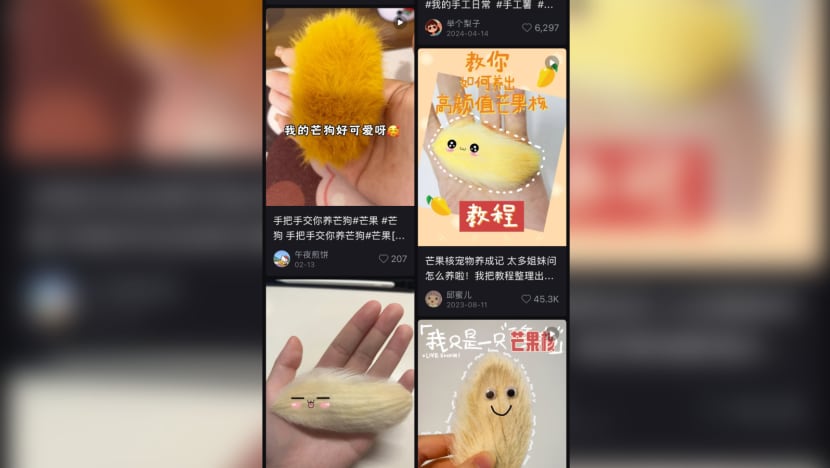'Something healing in being silly': Why ChinaŌĆÖs youth raise 'weird pets' for companionship
Experts say the trend reflects rising loneliness and urban pressure among Chinese youth.

From mango pits to blobs of toothpaste and jars of yeast, Chinese Gen Zers are finding joy in raising quirky ŌĆ£petsŌĆØ. (Image: Xiaohongshu/Maolizi, Xi, Ahzhuzaozao)

This audio is generated by an AI tool.
SINGAPORE: Most people would wash away excess toothpaste after brushing their teeth.┬Ā
But not Celeste Shao.┬Ā
The 23-year-old, from Jiangsu province in eastern China, went viral for ŌĆ£raisingŌĆØ a blob of blue toothpaste as a pet after it was ŌĆ£born in the sinkŌĆØ.┬Ā
Shao shared multiple steps for looking after her little toothpaste blob in that has garnered more than 95,000 likes and 12,000 comments since its publication in August 2024.┬Ā
ŌĆ£It needs to be watered regularly or it will slowly dry out. After being watered, it becomes plump and hydrated again,ŌĆØ she said in a series of lighthearted captions.
ŌĆ£When youŌĆÖre bored, you can watch it surf. Surfing helps maintain its moisture but will also shorten its lifespan,ŌĆØ she added.┬Ā
But one might argue that ShaoŌĆÖs toothpaste blob has not been the weirdest pet on the Chinese internet.
Over the past year, ŌĆ£mango dogsŌĆØ - the act of ŌĆ£groomingŌĆØ leftover mango seeds to look like cute and fluffy creatures, and pet rocks - with carefully crafted names and personalities - have been other strange hobbies gaining popularity among lonely and often stressed out Chinese Gen Zers.┬Ā
ŌĆ£ItŌĆÖs very interesting and I feel like it resonates with others too,ŌĆØ Shao told ┬ķČ╣┤½├Į.┬Ā
ŌĆ£IŌĆÖm very busy at work and donŌĆÖt have the energy to keep a real pet so a short-term ŌĆ£petŌĆØ like this lets me enjoy the fun of caring for a companion.ŌĆØ┬Ā

Not to be outdone, ŌĆ£yeast petsŌĆØ have also taken over Chinese social media sites, with many users giving their jars affectionate names like ŌĆ£Yeast BabyŌĆØ or ŌĆ£Little BubŌĆØ and sharing pictures and tips for fermenting and raising yeast mixtures of flour and water.
Many have compared the process to raising virtual pets like Tamagotchi toys, which were hugely popular among children and teenagers during the early 2000s.
ŌĆ£You donŌĆÖt need to walk it or clean up after it but itŌĆÖs alive,ŌĆØ said Xiao Xiao, a home baker from Shenzhen who has been actively documenting her journey raising a sourdough starter on Xiaohongshu.┬Ā
ŌĆ£It grows, breathes and responds to care,ŌĆØ she said.┬Ā
ŌĆ£When I open the lid and see bubbles forming, it makes me strangely happy.ŌĆØ┬Ā
Another baker by the user handle Peach, told ┬ķČ╣┤½├Į that she finds joy in the process of fermenting yeast ŌĆō whether sheŌĆÖs baking or just for fun. ŌĆ£Every time I open the container lid, I see the live yeast moving, and itŌĆÖs really exciting,ŌĆØ she said.
Just like taking care of real pets, keeping yeast alive requires commitment like feeding it daily with flour and water, she added.┬Ā
She has been raising her own ŌĆ£yeast babyŌĆØ for a few months and shared that the process was not easy especially during winter months because of colder temperatures.
ŌĆ£Of course (it brings emotional value), just like raising an animal,ŌĆØ she said.┬Ā
ŌĆ£When itŌĆÖs going well, it makes you happy. You have to feed it every day, right? It also takes a certain sense of responsibility. Even kids can enjoy playing with it.ŌĆØ┬Ā

Some choose to turn their emotional support ŌĆ£petsŌĆØ into tangy sourdough once the yeast has fermented strongly enough.┬Ā
But sadly, not all yeast experiments go well, as one Chinese blogger cautioned: ŌĆ£A healthy starter should smell like fruit or alcohol. If it stinks or (starts to) show mold, it needs to be thrown away.ŌĆØ┬Ā

On the popular Chinese shopping platform Taobao, ŌĆ£pet rocksŌĆØ have become a hot craze.┬Ā
A shop called XiaoxueG Design Inspirations Store, with nearly 900 followers, claims to have sold over 1,000 rocks.
ŌĆ£I donŌĆÖt have to worry about (my rock) dying, getting sick or barking at my neighbours,ŌĆØ wrote one user. ŌĆ£It just listens.ŌĆØ
Others revel in the humour and absurdity, saying itŌĆÖs just a fun and affordable way to express care and creativity at a time when real pets may be too costly or time-consuming.
ŌĆ£ThereŌĆÖs something healing in being silly,ŌĆØ one Chinese social media user said. ŌĆ£It reminds me not to take life too seriously.ŌĆØ
ŌĆ£ItŌĆÖs weird. ItŌĆÖs wholesome, and itŌĆÖs very human,ŌĆØ wrote another user on the Weibo microblogging site.┬Ā

RELIEVING STRESS AND EMOTIONAL PRESSURE
These unconventional hobbies reflect the growing need for Chinese Gen Zers to cope with stress and emotional pressure from daily life, experts said. ┬Ā┬Ā
ŌĆ£With urban life speeding up, many young people face mounting pressure and loneliness,ŌĆØ said Dr Qi Jing, Deputy Director of the Clinical Psychology Department at Hunan Second PeopleŌĆÖs Hospital.
ŌĆ£These static pets offer a kind of emotional outlet. They require little, but still create a sense of responsibility, connection and routine.ŌĆØ
Zhang Xin, an associate professor from Peking UniversityŌĆÖs School of Psychological and Cognitive Sciences, believes that these quirky trends point to a bigger picture.
ŌĆ£Any expression of emotion consumes psychological resources, and this expenditure is a cost to the individual,ŌĆØ he told ┬ķČ╣┤½├Į.┬Ā
ŌĆ£Caring also comes with physical and psychological costs.ŌĆØ┬Ā
ŌĆ£WhatŌĆÖs healing about this kind of relationship may lie in the fact that it requires neither emotional investment nor effort, so thereŌĆÖs no risk of getting hurt.ŌĆØ
Real or imaginary, Chinese millennials and Gen Zers continue to turn to pets over traditional family life.
According to a recent Goldman Sachs report, ChinaŌĆÖs pet population is set to nearly double the number of young children by 2030, as more young people delay or reject marriage and parenthood altogether.
By the end of the decade, the number of urban pets is expected to surpass 70 million, while children under age four will fall below 40 million.
This trend was on display at Pet Fair Asia last year, one of the regionŌĆÖs largest pet expos, held in Shanghai. Exhibitors filled all 17 permanent halls of the convention centre, with some even spilling into temporary spaces, to cater to growing demand from child-free couples and young professionals investing in ŌĆ£fur kidsŌĆØ.
ŌĆ£Our generation has little desire to have kids. And pets do provide companionship and fulfill part of the functions that kids perform,ŌĆØ said Liu Yinghui, a cat owner in her 30s who attended the fair with her husband.
ŌĆ£Rearing a cat is almost like raising a child.ŌĆØ
But for those unwilling or unable to make that commitment, a blob of yeast or a mango seed might just do the trick.












